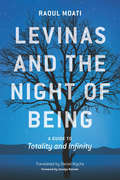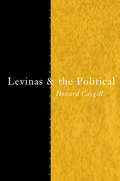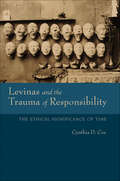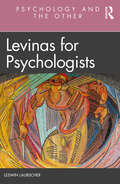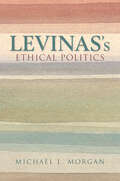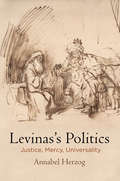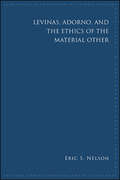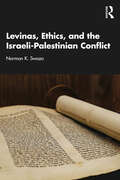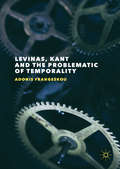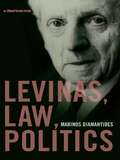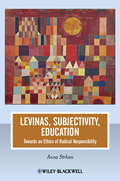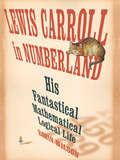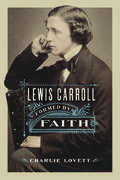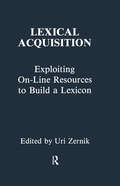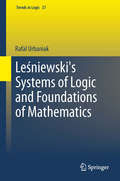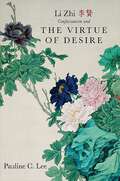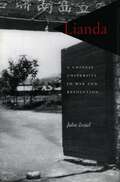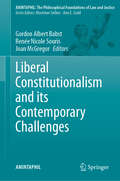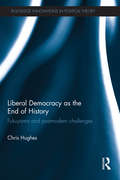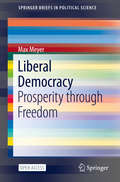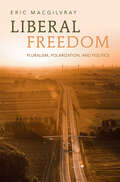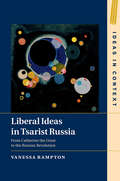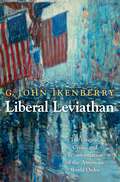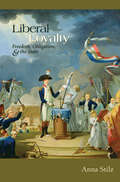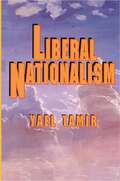- Table View
- List View
Levinas and the Night of Being: A Guide to Totality and Infinity
by Raoul MoatiCan we say that metaphysics is over? That we live, as post-phenomenology claims, after “end of metaphysics”? Through a close reading of Levinas's masterpiece Totality and Infinity, Raoul Moati shows that things are much more complicated.Totality and Infinity proposes not so much an alternative to Heidegger’s ontology as a deeper elucidation of the meaning of “being” beyond Heidegger’s fundamental ontology. The metaphor of the night becomes crucial in order to explore a nocturnal face of the events of being beyond their ontological reduction to the understanding of being. The deployment of being beyond its intentional or ontological reduction coincides with what Levinas calls “nocturnal events.” Insofar as the light of understanding hides them, it is only through deformalizing the traditional phenomenological approach to phenomena that Levinas leads us to their exploration and their systematic and mutual implications. Following Levinas's account of these "nocturnal events," Moati elaborates the possibility of what he calls a "metaphysics of society" that cannot be integrated into the deconstructive grasp of the "metaphysics of presence." Ultimately, Levinas and the Night of Being opens the possibility of a revival of metaphysics after the "end of metaphysics".
Levinas and the Political (Thinking the Political)
by Howard CaygillHoward Caygill systematically explores for the first time the relationship between Levinas' thought and the political. From Levinas' early writings in the face of National Socialism to controversial political statements on Israeli and French politics, Caygill analyses themes such as the deconstruction of metaphysics, embodiment, the face and alterity.He also examines Levinas' engagement with his contemporaries Heidegger and Bataille, and the implications of his rethinking of the political for an understanding of the Holocaust.
Levinas and the Trauma of Responsibility: The Ethical Significance of Time (Studies in Continental Thought)
by Cynthia D. CoeLevinas's account of responsibility challenges dominant notions of time, autonomy, and subjectivity according to Cynthia D. Coe. Employing the concept of trauma in Levinas's late writings, Coe draws together his understanding of time and his claim that responsibility is an obligation to the other that cannot be anticipated or warded off. Tracing the broad significance of these ideas, Coe shows how Levinas revises our notions of moral agency, knowledge, and embodiment. Her focus on time brings a new interpretive lens to Levinas's work and reflects on a wider discussion of the fragmentation of human experience as an ethical subject. Coe's understanding of trauma and time offers a new appreciation of how Levinas can inform debates about gender, race, mortality, and animality.
Levinas for Psychologists (Psychology and the Other)
by Leswin LaubscherLevinas for Psychologists provides a rigorous, yet accessible, examination of Emmanuel Levinas’s philosophy and its implications for psychology and the human and social sciences. Comprehensive in scope, this book traces Levinas’s thought across the arc of his oeuvre, from the earliest works to the last interviews and essays. Laubscher provides numerous examples of how Levinas’s thought challenges current clinical and psychotherapeutic work, psychological theory, social science research, and social theory but also offers promising alternatives. Such alternative ways to think and practice psychology are richly illuminated by accessible examples from therapy, research, and the social everyday. The volume makes Levinas’s dense and demanding philosophical language comprehensible and accessible, without losing the radical, profound, and poetic qualities of the original. Issues of justice, racism, and nature are addressed throughout, and these insights and conclusions are placed within a contemporary context. This book is essential reading for psychologists, philosophers, and anyone interested in the legacy of Levinas’s work.
Levinas's Ethical Politics (The\helen And Martin Schwartz Lectures In Jewish Studies)
by Michael L. MorganEmmanuel Levinas conceives of our lives as fundamentally interpersonal and ethical, claiming that our responsibilities to one another should shape all of our actions. While many scholars believe that Levinas failed to develop a robust view of political ethics, Michael L. Morgan argues against understandings of Levinas's thought that find him politically wanting or even antipolitical. Morgan examines Levinas's ethical critique of the political as well as his Jewish writings--including those on Zionism and the founding of the Jewish state--which are controversial reflections of Levinas's political expression. Unlike others who dismiss Levinas as irrelevant or anarchical, Morgan is the first to give extensive treatment to Levinas as a serious social political thinker whose ethics must be understood in terms of its political implications. Morgan reveals Levinas's political commitments to liberalism and democracy as well as his revolutionary conception of human life as deeply interconnected on philosophical, political, and religious grounds.
Levinas's Politics: Justice, Mercy, Universality (Haney Foundation Series)
by Annabel HerzogEmmanuel Levinas (1906-1995) was a French philosopher known for his radical ethics and for his contribution to Jewish thought in his commentaries on Talmudic sources. In Levinas's Politics, Annabel Herzog confronts a major difficulty in Levinas's philosophy: the relationship between ethics and politics. Levinas's ethics describes the encounter with the other, that is, with any other human being. For Levinas, the face-to-face encounter is a relationship in which the ego is commanded by a transcendent and unquestionable order to take responsibility for the other person. Politics, on the other hand, presupposes at least three people: the ego, the other, and any third party. Among three people, nothing can be transcendent; on the contrary, everything must be negotiated.Against the conventional view of Levinas's conception of the political as the interruption and collapse of the ethical, Herzog argues that in the Talmudic readings, Levinas constructed politics positively. She shows that Levinas's Talmudic readings embody a pragmatism that complements, revises, and challenges the extreme ethical analyses he offers in his phenomenological works—Totality and Infinity, Otherwise than Being, and Of God Who Comes to Mind. Her analysis illuminates Levinas's explanations of the relationship between ethics and politics: ethics is the foundation of justice; justice contains a necessary violence that must be moderated by mercy; and justice, general laws, and national aspirations must be linked in an attempt to "improve universality itself."
Levinas, Adorno, and the Ethics of the Material Other (SUNY series in Contemporary French Thought)
by Eric S. NelsonThis book sets up a dialogue between Emmanuel Levinas and Theodor W. Adorno, using their thought to address contemporary environmental and social-political situations. Eric S. Nelson explores the "non-identity thinking" of Adorno and the "ethics of the Other" of Levinas with regard to three areas of concern: the ethical position of nature and "inhuman" material others such as environments and animals; the bonds and tensions between ethics and religion and the formation of the self through the dynamic of violence and liberation expressed in religious discourses; and the problematic uses and limitations of liberal and republican discourses of equality, liberty, tolerance, and their presupposition of the private individual self and autonomous subject. Thinking with and beyond Levinas and Adorno, this work examines the possibility of an anarchic hospitality and solidarity between material others and sensuous embodied life.
Levinas, Ethics, and the Israeli-Palestinian Conflict
by Norman K. SwazoThis book engages with the philosophical thought of French-Jewish philosopher Emmanuel Levinas. It studies some of his Talmudic readings and his concern for a Jewish “universal ethics.” It does so in relation to the protracted Israeli-Palestinian conflict and the moral imperatives that apply to the conduct of the State of Israel and the Israeli Defense Forces (IDF) vis-a-vis the Palestinian people. The book not only looks at what Levinas understands about the moral “universality” of the Talmud but also applies this understanding to the assessment of the IDF military operations ongoing in Gaza since October 7, 2023. In this way, the author makes a distinction between the moral teaching of rabbinic Judaism to which Levinas appeals for its universality (on the one hand) and the ideology of political Zionism (on the other hand) to which Levinas subscribed, hence moral critique of the latter required in view of this moral teaching.A unique contribution, this book will be indispensable to scholars and researchers of European philosophy, Jewish ethics, religious studies, Talmudic studies, and contemporary moral philosophy, as well as those interested in the Israeli-Palestinian conflict.
Levinas, Kant and the Problematic of Temporality
by Adonis FrangeskouThis book offers an ethical interpretation of the Critique of Pure Reason by establishing the historical connection between the problematic of Temporality in the philosophies of Heidegger and Levinas on the one hand, and the ground-laying of metaphysics in the schematism of Kant's critical philosophy on the other. Drawing on Levinas's ethical critique of the Heideggerian problematic of Temporality together with his destructive proposal to carry out the deformalization of the Kantian notion of time in a manner consistent with Rosenzweig's philosophy, the book argues that this historical connection should be established at the point where Kant determines the ethical status of the schematism according to the regulative schemas of the ideas of pure reason, and not, as in Heidegger's ontological destruction, at the point of his determination of the sensible schemas of the pure concepts of understanding alone.
Levinas, Law, Politics
by Marinos DiamantidesEmmanuel Levinas' re-formulation of subjectivity, responsibility and the good has radically influenced post-structuralist thought. Political and legal theory, however, have only marginally profited from his moral philosophy. Levinas' theme of one's infinite responsibility for the other has often been romanticized by some advocates of multiculturalism and natural justice. In this volume, political theorists, philosophers and legal scholars critically engage with this idealization of Levinas’ ethics. The authors show that his crucial formulation of the idea of 'the other in me' does not offer a quick cure for today's nationalist, racist and religious divides. Nor does his notion of anarchic responsibility provide immediate relief for the agony of dealing with matters of life and death. The rebelliousness of Levinas' thought is rediscovered here and used to challenge preconceptions of social, legal and individual responsibility.
Levinas, Subjectivity, Education: Towards an Ethics of Radical Responsibility (Journal of Philosophy of Education)
by Anna StrhanLevinas, Subjectivity, Education explores how the philosophical writings of Emmanuel Levinas lead us to reassess education and reveals the possibilities of a radical new understanding of ethical and political responsibility. Presents an original theoretical interpretation of Emmanuel Levinas that outlines the political significance of his work for contemporary debates on education Offers a clear analysis of Levinas’s central philosophical concepts, including the place of religion in his work, demonstrating their relevance for educational theorists Examines Alain Badiou’s critique of Levinas’s work Considers the practical implications of Levinas’ theories for concrete educational practices and frameworks
Lewis Carroll in Numberland: His Fantastical Mathematical Logical Life
by Robin Wilson"A fine mathematical biography."--John Allen Paulos, New York Times Book Review Just when we thought we knew everything about Lewis Carroll, here comes this "insightful . . . scholarly . . . serious" (John Butcher, American Scientist) biography that will appeal to Alice fans everywhere. Fascinated by the inner life of Charles Lutwidge Dodgson, Robin Wilson, a Carroll scholar and a noted mathematics professor, has produced this revelatory book--filled with more than one hundred striking and often playful illustrations--that examines the many inspirations and sources for Carroll's fantastical writings, mathematical and otherwise. As Wilson demonstrates, Carroll made significant contributions to subjects as varied as voting patterns and the design of tennis tournaments, in the process creating large numbers of imaginative recreational puzzles based on mathematical ideas.
Lewis Carroll: Formed by Faith
by Charlie LovettFor Lewis Carroll, a deacon in the Church of England, faith in Christ and belief in a loving God stood at the core of his being, but little has been written about what the church or faith meant to the celebrated author of the Alice books. With Lewis Carroll: Formed by Faith, Charlie Lovett provides the first in-depth study of the religious life of the famous author, whose real name was Charles Lutwidge Dodgson.By examining Dodgson’s religious education and core beliefs, this book shows how a deep Christian faith undergirded and guided every part of his life and work, from his relationships with children to his renowned writings, his work on logic, even his hobbies of photography and theatre going. The book includes a detailed account of the career of Dodgson’s father—an important figure in the Anglican church and a key influence on his son.Family records give insight into Charles’s early education, and newly discovered manuscript materials paint a full picture of his religious education at Richmond and Rugby Schools. Lovett finds previously unknown influences in Dodgson’s life, analyzes his habits of preaching and prayer, explores his training for confirmation and ordination, analyzes his reasons for eschewing the priesthood, and concludes with an account of his death and funeral and his logically constructed theology of the afterlife. The book makes use of previously untapped sources and highlights new material, including a previously unknown sermon by Dodgson, the first ever discovered. The result is a major contribution offering new perspectives on this creator of fantastical fiction and the spiritual bedrock that informed his life and imagination.
Lexical Acquisition: Exploiting On-line Resources To Build A Lexicon
by Uri ZernikOn-line information -- and free text in particular -- has emerged as a major, yet unexploited, resource available in raw form. Available, but not accessible. The lexicon provides the major key for enabling accessibility to on-line text. The expert contributors to this book explore the range of possibilities for the generation of extensive lexicons. In so doing, they investigate the use of existing on-line dictionaries and thesauri, and explain how lexicons can be acquired from the corpus -- the text under investigation -- itself. Leading researchers in four related fields offer the latest investigations: computational linguists cover the natural language processing aspect; statisticians point out the issues involved in the use of massive data; experts discuss the limitations of current technology; and lexicographers share their experience in the design of the traditional dictionaries.
Leśniewski's Systems of Logic and Foundations of Mathematics
by Rafal UrbaniakThis meticulous critical assessment of the ground-breaking work of philosopher Stanislaw Leśniewski focuses exclusively on primary texts and explores the full range of output by one of the master logicians of the Lvov-Warsaw school. The author's nuanced survey eschews secondary commentary, analyzing Leśniewski's core philosophical views and evaluating the formulations that were to have such a profound influence on the evolution of mathematical logic. One of the undisputed leaders of the cohort of brilliant logicians that congregated in Poland in the early twentieth century, Leśniewski was a guide and mentor to a generation of celebrated analytical philosophers (Alfred Tarski was his PhD student). His primary achievement was a system of foundational mathematical logic intended as an alternative to the Principia Mathematica of Alfred North Whitehead and Bertrand Russell. Its three strands--'protothetic', 'ontology', and 'mereology', are detailed in discrete sections of this volume, alongside a wealth other chapters grouped to provide the fullest possible coverage of Leśniewski's academic output. With material on his early philosophical views, his contributions to set theory and his work on nominalism and higher-order quantification, this book offers a uniquely expansive critical commentary on one of analytical philosophy's great pioneers.
Li Zhi, Confucianism, and the Virtue of Desire (SUNY series in Chinese Philosophy and Culture)
by Pauline C. LeeLi Zhi (1527–1602) was a bestselling author with a devoted readership. His biting, shrewd, and visionary writings with titles like A Book to Hide and A Book to Burn were both inspiring and inflammatory. Widely read from his own time to the present, Li Zhi has long been acknowledged as an important figure in Chinese cultural history. While he is esteemed as a stinging social critic and an impassioned writer, Li Zhi's ideas have been dismissed as lacking a deeper or constructive vision. Pauline C. Lee convincingly shows us otherwise. Situating Li Zhi within the highly charged world of the late-Ming culture of "feelings," Lee presents his slippery and unruly yet clear and robust ethical vision. Li Zhi is a Confucian thinker whose consuming concern is a powerful interior world of abundance, distinctive to each individual: the realm of the emotions. Critical to his ideal of the good life is the ability to express one's feelings well. In the work's conclusion, Lee brings Li Zhi's insights into conversation with contemporary philosophical debates about the role of feelings, an ethics of authenticity, and the virtue of desire.
Lianda
by John IsraelIn the summer of 1937, Japanese troops occupied the campuses of Beijing’s two leading universities, Beida and Qinghua, and reduced Nankai, in Tianjin, to rubble. These were China's leading institutions of higher learning, run by men educated in the West and committed to modern liberal education. The three universities first moved to Changsha, 900 miles southwest of Beijing, where they joined forces. But with the fall of Nanjing in mid-December, many students left to fight the Japanese, who soon began bombing Changsha. In February 1938, the 800 remaining students and faculty made the thousand-mile trek to Kunming, in China’s remote, mountainous southwest, where they formed the National Southwest Associated University (Lianda). In makeshift quarters, subject to sporadic bombing by the Japanese and shortages of food, books, and clothing, students and professors did their best to conduct a modern university. In the next eight years, many of China’s most prominent intellectuals taught or studied at Lianda. This book is the story of their lives and work under extraordinary conditions. Lianda’s wartime saga crystallized the experience of a generation of Chinese intellectuals, beginning with epic journeys, followed by years of privation and endurance, and concluding with politicization, polarization, and radicalization, as China moved from a war of resistance against a foreign foe to a civil war pitting brother against brother. The Lianda community, which had entered the war fiercely loyal to the government of Chiang Kai-shek, emerged in 1946 as a bastion of criticism of China’s ruling Guomindang party. Within three years, the majority of the Lianda community, now returned to its north China campuses in Beijing and Tianjin, was prepared to accept Communist rule. In addition to struggling for physical survival, Lianda’s faculty and students spent the war years striving to uphold a model of higher education in which modern universities, based in large part on the American model, sought to preserve liberal education, political autonomy, and academic freedom. Successful in the face of wartime privations, enemy air raids, and Guomindang pressure, Lianda’s constituent universities eventually succumbed to Communist control. By 1952, the Lianda ideal had been replaced with a politicized and technocratic model borrowed from the Soviet Union.
Liberal Constitutionalism and its Contemporary Challenges (AMINTAPHIL: The Philosophical Foundations of Law and Justice #12)
by Joan McGregor Gordon Albert Babst Renée Nicole SourisThe edited volume brings together contemporary work by philosophers, legal scholars, and political theorists. This volume presents relevant understandings of the common good, democracy, liberty, and law, and situates them in the context of contemporary countervailing pressures posed by issues in education, access to medical treatment in a pandemic, and the media. Motivated to ascertain how democracy is threatened by a variety contemporary challenges, the authors examine core aspects of law, representative democracy, and constitutionalism to shed light on worrisome contemporary phenomena such as social media-driven conspiracy theories, unequal access to education and medical treatment, among other topics.
Liberal Democracy as the End of History: Fukuyama and Postmodern Challenges (Routledge Innovations in Political Theory)
by Christopher HughesFrancis Fukuyama claims that liberal democracy is the end of history. This book provides a theoretical re-examination of this claim through postmodernist ideas. The book argues that postmodern ideas provide a valuable critique to Fukuyama’s thesis, and poses the questions: can we talk about a universal and teleological history; a universal human nature; or an autonomous individual? It addresses whether postmodern theories - concerning the movement of time, what it means to be human, and what it means to be an individual/subject - can be accommodated within a theory of a history that ends in liberal democracy. The author argues that incorporating elements of postmodern thought into Fukuyama’s theory makes it possible to produce a stronger and more compelling account of the theory that liberal democracy is the end of history. The result of this is to underpin Fukuyama’s theory with a more complex understanding of the movement of time, the human and the individual, and to show that postmodern concepts can, paradoxically, be used to strengthen Fukuyama’s theory that the end of history is liberal democracy. The book will be of interest to students and scholars of political theory, postmodernism and the work of Francis Fukuyama.
Liberal Democracy: Prosperity through Freedom (SpringerBriefs in Political Science)
by Max MeyerThis open access book aims to show which factors have been decisive in the rise of successful countries. Never before have so many people been so well off. However, prosperity is not a law of nature; it has to be worked for. A liberal economy stands at the forefront of this success – not as a political system, but as a set of economic rules promoting competition, which in turn leads to innovation, research and enormous productivity. Sustainable prosperity is built on a foundation of freedom, equal opportunity and a functioning government. This requires a stable democracy that cannot be defeated by an autocrat. Autocrats claim that “illiberalism” is more efficient, an assertion that justifies their own power. Although autocrats can efficiently guide the first steps out of poverty, once a certain level of prosperity has been achieved, people begin to demand a sense of well-being – freedom and codetermination. Only when this is possible will they feel comfortable, and progress will continue. Respect for human rights is crucial.The rules of the free market do not lean to either the right or left politically. Liberalism and the welfare state are not mutually exclusive. The “conflict” concerns the amount of government intervention. Should there be more or less?As a lawyer, entrepreneur, and board member with over 40 years of experience in this field of conflict, the author clearly describes the conditions necessary for a country to maintain its position at the top.
Liberal Freedom: Pluralism, Polarization, and Politics
by Eric MacGilvrayWe seem to be losing the ability to talk to each other about – and despite – our political differences. The liberal tradition, with its emphasis on open-mindedness, toleration, and inclusion, is ideally suited to respond to this challenge. Yet liberalism is often seen today as a barrier to constructive dialogue: narrowly focused on individual rights, indifferent to the communal sources of human well-being, and deeply implicated in structures of economic and social domination. This book provides a novel defense of liberalism that weaves together a commitment to republican self-government, an emphasis on the value of unregulated choice, and an appreciation of how hard it is to strike a balance between them. By treating freedom rather than justice as the central liberal value this important book, critical to the times, provides an indispensable resource for constructive dialogue in a time of political polarization.
Liberal Ideas in Tsarist Russia: From Catherine the Great to the Russian Revolution (Ideas in Context #126)
by Vanessa RamptonLiberalism is a critically important topic in the contemporary world as liberal values and institutions are in retreat in countries where they seemed relatively secure. Lucidly written and accessible, this book offers an important yet neglected Russian aspect to the history of political liberalism. Vanessa Rampton examines Russian engagement with liberal ideas during Russia's long nineteenth century, focusing on the high point of Russian liberalism from 1900 to 1914. It was then that a self-consciously liberal movement took shape, followed by the founding of the country's first liberal (Constitutional-Democratic or Kadet) party in 1905. For a brief, revelatory period, some Russians - an eclectic group of academics, politicians and public figures - drew on liberal ideas of Western origin to articulate a distinctively Russian liberal philosophy, shape their country's political landscape, and were themselves partly responsible for the tragic experience of 1905.
Liberal Leviathan: The Origins, Crisis, and Transformation of the American World Order (Princeton Studies in International History and Politics #141)
by G. John IkenberryA new vision for the American world orderIn the second half of the twentieth century, the United States engaged in the most ambitious and far-reaching liberal order building the world had yet seen. This liberal international order has been one of the most successful in history in providing security and prosperity to more people. But in the last decade, the American-led order has been troubled. Some argue that the Bush administration, with its war on terror, invasion of Iraq, and unilateral orientation, undermined this liberal order. Others argue that we are witnessing the end of the American era. Liberal Leviathan engages these debates.G. John Ikenberry argues that the crisis that besets the American-led order is a crisis of authority. A political struggle has been ignited over the distribution of roles, rights, and authority within the liberal international order. But the deeper logic of liberal order remains alive and well. The forces that have triggered this crisis—the rise of non-Western states such as China, contested norms of sovereignty, and the deepening of economic and security interdependence—have resulted from the successful functioning and expansion of the postwar liberal order, not its breakdown. The liberal international order has encountered crises in the past and evolved as a result. It will do so again.Ikenberry provides the most systematic statement yet about the theory and practice of the liberal international order, and a forceful message for policymakers, scholars, and general readers about why America must renegotiate its relationship with the rest of the world and pursue a more enlightened strategy—that of the liberal leviathan.
Liberal Loyalty: Freedom, Obligation, and the State
by Anna StilzMany political theorists today deny that citizenship can be defended on liberal grounds alone. Cosmopolitans claim that loyalty to a particular state is incompatible with universal liberal principles, which hold that we have equal duties of justice to persons everywhere, while nationalist theorists justify civic obligations only by reaching beyond liberal principles and invoking the importance of national culture. In Liberal Loyalty, Anna Stilz challenges both views by defending a distinctively liberal understanding of citizenship. Drawing on Kant, Rousseau, and Habermas, Stilz argues that we owe civic obligations to the state if it is sufficiently just, and that constitutionally enshrined principles of justice in themselves--rather than territory, common language, or shared culture--are grounds for obedience to our particular state and for democratic solidarity with our fellow citizens. She demonstrates that specifying what freedom and equality mean among a particular people requires their democratic participation together as a group. Justice, therefore, depends on the authority of the democratic state because there is no way equal freedom can be defined or guaranteed without it. Yet, as Stilz shows, this does not mean that each of us should entertain some vague loyalty to democracy in general. Citizens are politically obligated to their own state and to each other, because within their particular democracy they define and ultimately guarantee their own civil rights. Liberal Loyalty is a persuasive defense of citizenship on purely liberal grounds.
Liberal Nationalism (Studies in Moral, Political, and Legal Philosophy #47)
by Yael Tamir"This is a most timely, intelligent, well-written, and absorbing essay on a central and painful social and political problem of our time."—Isaiah Berlin"The major achievement of this remarkable book is a critical theory of nationalism, worked through historical and contemporary examples, explaining the value of national commitments and defining their moral limits. Tamir explores a set of problems that philosophers have been notably reluctant to take on, and leaves us all in her debt."—Michael WalzerIn this provocative work, Yael Tamir urges liberals not to surrender the concept of nationalism to conservative, chauvinist, or racist ideologies. In her view, liberalism, with its respect for personal autonomy, reflection, and choice, and nationalism, with its emphasis on belonging, loyalty, and solidarity, are not irreconcilable. Here she offers a new theory, "liberal nationalism," which allows each set of values to accommodate the other. Tamir sees nationalism as an affirmation of communal and cultural memberships and as a quest for recognition and self-respect. Persuasively she argues that national groups can enjoy these benefits through political arrangements other than the nation-state. While acknowledging that nationalism places members of national minorities at a disadvantage, Tamir offers guidelines for alleviating the problems involved, using examples from currents conflicts in the Middle East and Eastern Europe.Liberal Nationalism is an impressive attempt to tie together a wide range of issues often kept apart: personal autonomy, cultural membership, political obligations, particularity versus impartiality in moral duties, and global justice. Drawing on material from disparate fields—including political philosophy, ethics, law, and sociology—Tamir brings out important and previously unnoticed interconnections between them, offering a new perspective on the influence of nationalism on modern political philosophy.
